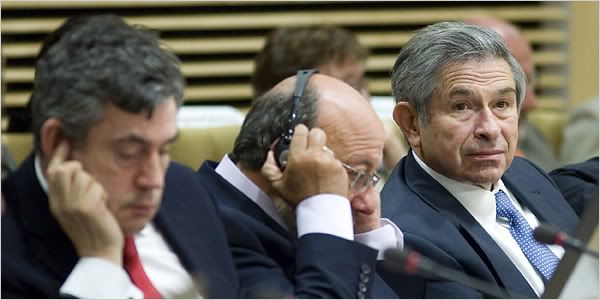Will Corruption Rule At World Bank?
 WaPo reports today that Paul Wolfowitz' days at the helm of the World Bank are numbered. I say let's wait before reporting this particular death because Wolfowitz has enough support to qualify him as "only partly dead," at a minimum. Nevertheless, here's WaPo:
WaPo reports today that Paul Wolfowitz' days at the helm of the World Bank are numbered. I say let's wait before reporting this particular death because Wolfowitz has enough support to qualify him as "only partly dead," at a minimum. Nevertheless, here's WaPo:The World Bank executive board has concluded that the bank's president, Paul D. Wolfowitz, broke ethics rules in engineering a hefty pay raise for his girlfriend, and plans to try to end his tenure next week, senior bank officials said yesterday.Were I Wolfowitz in that case, I would simply vote my one vote as president and adopt a resolution of no confidence in the board and tell them that if they don't want to screw themselves, then he, Wolfowitz, will be happy to do the screwing for them.Board members do not want to vote to fire Wolfowitz, the officials said, since that might provoke a rupture with the bank's largest shareholder, the United States. Instead, they are inclined to adopt a resolution saying they have lost confidence in him, hoping that will persuade him to resign.
That is, after all, what this most of this whole thing is about. Wolfowitz is trying to purge the World Bank of its rampant corruption and his efforts are a grave risk to the countries represented on the board that wallow in corruption and benefit from it.
(The other part of the story line is Wolfowitz' commitment to trim the World Bank staff and payroll, which, while necessary for the bank's survival, has made him the blood enemy of the staff, which leaked the news on his hi jinx with his squeeze.)
Reader Charlie suggested I read about the China connection to all this, linking to a story by Patricia Adams in Canada's Financial Post. It's quite a story. Here's the China connection:
But [despite more competition from private banks] the bank has had one competitive advantage that no private-sector Western lender can match -- a willingness to lend large sums to corrupt Third World administrations with few governance strings attached. Wolfowitz' arrival in 2005, and the anti-corruption measures he has brought in, have jeopardized that advantage big time, as seen in a chilling memo the bank received on March 12 of this year.
The e-mail memo, entitled "Sanctions Reform Roll-Out in EAP [East Asia and Pacific Region] -- Your Feedback Needed," was from the manager of the bank's operation in China, Hsiao-Yun Elaine Sun, to James Adams, vice-president for East Asia and Pacific Region. It warned that the bank could lose its second-largest customer, the Chinese government, if it insisted on carrying through with its intention to hold borrowing countries to account for World Bank monies that were used inappropriately.
China's Ministry of Finance (MOF) "is very concerned about the implementation. They foresee potential disagreements as to the scope, level, and approach of the bank's involvement on specific cases. Our MOF counterpart is so worried and is considering to suspend the lending program discussions next year in order to avoid getting into a confrontational situation with the bank."
Losing a large borrower like China, which has some US$21-billion in outstanding loans and credits with the bank, and accounts for close to 10% of the bank's total portfolio, would lead to significant staff layoffs. Moreover, at least three other countries -- India, Mexico and Indonesia --have also expressed alarm at the bank's anti-corruption program, which would make their officials subject to investigation and exposure. These four countries alone, ranked first, second, third and fifth in size among bank customers, account for 30% of all World Bank business.
Adams points out that the leak of Wolfowitz' mini-indiscretion came just two weeks after Sun wrote the memo expressing concern about efforts to bring an end to the World Bank's maxi-indiscretions.
So is the rule that if you make the corruption big enough and pervasive enough, then you must pretend it's really not there at all? Even if, as is the case, 20 to 30 percent of the World Bank's total lending simply goes missing? Is Wolfowitz being fired because he slipped some money to his girlfriend, or because he's trying to stop millions of dollars going into the pockets of corrupt dictators and go-betweens?
The answer is obvious. The staff, which almost universally fears where Wolfowitz' investigations and efficiencies will lead, is teamed with the corrupt members of the board to keep their graft empire afloat.
The U.S., Canada, Japan and various non-corrupt states stand allied for Wolfowitz and what he stands for.So the question boils down to this: Who will win, the masters of large-scale corruption or the good man who stupidly engaged in some small-scale dishonesty?
Photo: NYT
Labels: World Bank




<< Home